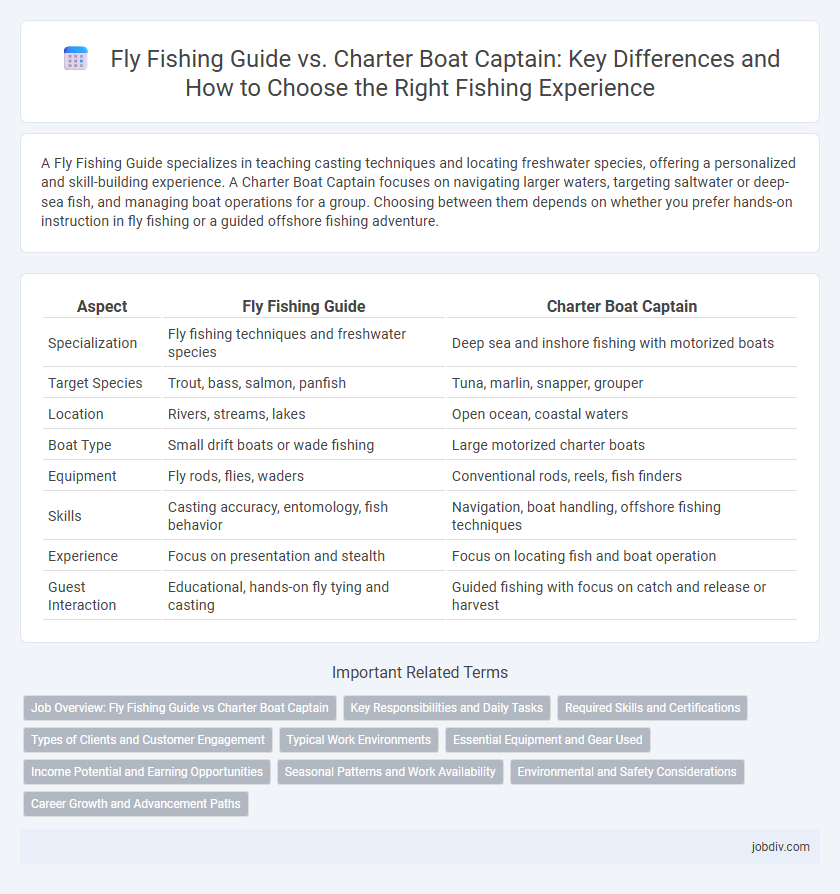A Fly Fishing Guide specializes in teaching casting techniques and locating freshwater species, offering a personalized and skill-building experience. A Charter Boat Captain focuses on navigating larger waters, targeting saltwater or deep-sea fish, and managing boat operations for a group. Choosing between them depends on whether you prefer hands-on instruction in fly fishing or a guided offshore fishing adventure.
Table of Comparison
| Aspect | Fly Fishing Guide | Charter Boat Captain |
|---|---|---|
| Specialization | Fly fishing techniques and freshwater species | Deep sea and inshore fishing with motorized boats |
| Target Species | Trout, bass, salmon, panfish | Tuna, marlin, snapper, grouper |
| Location | Rivers, streams, lakes | Open ocean, coastal waters |
| Boat Type | Small drift boats or wade fishing | Large motorized charter boats |
| Equipment | Fly rods, flies, waders | Conventional rods, reels, fish finders |
| Skills | Casting accuracy, entomology, fish behavior | Navigation, boat handling, offshore fishing techniques |
| Experience | Focus on presentation and stealth | Focus on locating fish and boat operation |
| Guest Interaction | Educational, hands-on fly tying and casting | Guided fishing with focus on catch and release or harvest |
Job Overview: Fly Fishing Guide vs Charter Boat Captain
A Fly Fishing Guide specializes in freshwater environments, offering expert instruction on fly casting techniques, entomology, and river navigation to enhance the angler's experience. A Charter Boat Captain operates primarily on saltwater or large freshwater bodies, managing vessel navigation, safety protocols, and targeting diverse fish species for clients. Both roles require deep knowledge of fishing tactics and local ecosystems but differ in setting, client interaction style, and operational responsibilities.
Key Responsibilities and Daily Tasks
Fly fishing guides specialize in instructing clients on casting techniques, identifying insect hatches, and reading freshwater rivers or streams to improve catch rates. Charter boat captains manage navigation, safety protocols, and equipment maintenance while leading clients on offshore or deep-sea fishing expeditions. Both roles require expert knowledge in fish behavior and habitat but differ in environment focus--fly fishing on inland waters versus charter captains on open water vessels.
Required Skills and Certifications
Fly fishing guides require expert knowledge of entomology, casting techniques, and local fish behavior, often holding certifications in specialized fly fishing instruction and first aid. Charter boat captains must possess a captain's license such as the U.S. Coast Guard Master License, maritime navigation skills, and safety training including CPR and vessel operation. Both roles demand strong communication skills and a deep understanding of environmental regulations to ensure safe, sustainable fishing experiences.
Types of Clients and Customer Engagement
Fly fishing guides specialize in personalized, often one-on-one experiences tailored to anglers seeking in-depth instruction and intimate access to specific freshwater habitats. Charter boat captains cater to diverse groups ranging from casual tourists to avid anglers, emphasizing large-scale excursions and accommodating varying skill levels on saltwater or freshwater. Both roles require exceptional customer engagement, but guides focus on education and technique refinement, while captains prioritize safety, navigation, and maximizing catch opportunities for groups.
Typical Work Environments
Fly fishing guides typically work in rivers, streams, and freshwater lakes, navigating shallow waters and often hiking to remote locations to access prime fishing spots. Charter boat captains operate on larger bodies of water such as oceans, bays, and large lakes, managing boats and guiding clients in diverse marine environments that can include deep sea fishing. Both roles demand extensive knowledge of local fish species, water conditions, and weather patterns to ensure successful fishing experiences.
Essential Equipment and Gear Used
Fly fishing guides rely heavily on specialized gear such as lightweight fly rods, flies tailored to local insect hatches, tapered leaders, and wading apparel designed for stealth and comfort in freshwater streams. Charter boat captains equip their vessels with heavy-duty rods, reels suited for saltwater species, fish-finding electronics, GPS systems, and safety gear to handle offshore conditions. Both professionals carry essential tools like forceps, landing nets, and proper tackle storage, but their equipment is specifically optimized for either riverbank fishing or deep-sea angling environments.
Income Potential and Earning Opportunities
Fly fishing guides typically earn income through hourly or daily rates, often supplemented by tips and equipment rentals, with seasonal fluctuations affecting overall earnings. Charter boat captains generally experience higher earning potential due to the ability to charge per trip, accommodate multiple clients simultaneously, and offer extended trips, increasing revenue streams. Both roles benefit from specialized skills and local knowledge, but charter captains usually access broader markets and higher-income opportunities.
Seasonal Patterns and Work Availability
Fly fishing guides often experience peak demand during spring and early summer when trout and other freshwater species are most active, resulting in highly seasonal work availability. Charter boat captains typically have a longer fishing season, extending from late spring through fall, targeting saltwater species whose runs are influenced by tidal and migratory patterns. Understanding these seasonal patterns helps anglers select the right expert based on preferred fishing times and target species.
Environmental and Safety Considerations
Fly fishing guides specialize in eco-friendly practices such as catch-and-release and minimizing habitat disturbance, promoting sustainability in freshwater ecosystems. Charter boat captains prioritize safety protocols, including thorough vessel maintenance, weather monitoring, and adherence to maritime regulations to protect anglers on open water. Both roles emphasize responsible stewardship and risk management tailored to their specific fishing environments.
Career Growth and Advancement Paths
Fly fishing guides often develop specialized skills in casting techniques, aquatic entomology, and local ecosystems, which can lead to roles in guiding higher-end private clients or starting their own guiding businesses. Charter boat captains gain expertise in navigation, vessel operation, and large-scale fishery knowledge, enabling career advancement toward fleet management or marine tourism entrepreneurship. Both career paths offer unique growth opportunities, with guides focusing on personalized angling experiences and captains on broader maritime leadership roles.
Fly Fishing Guide vs Charter Boat Captain Infographic

 jobdiv.com
jobdiv.com